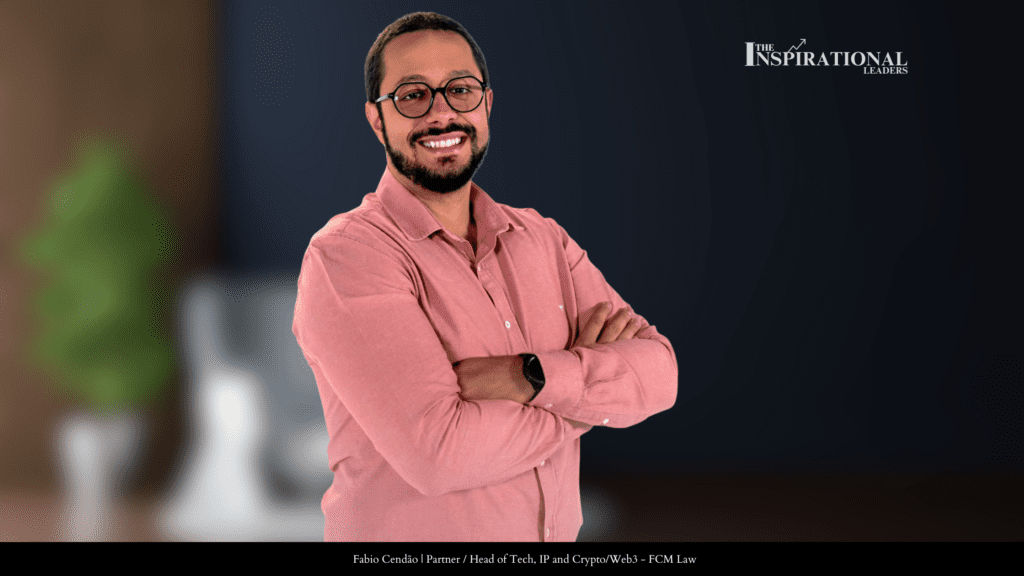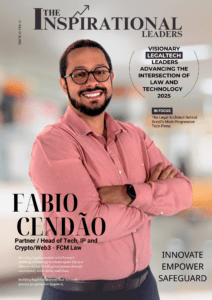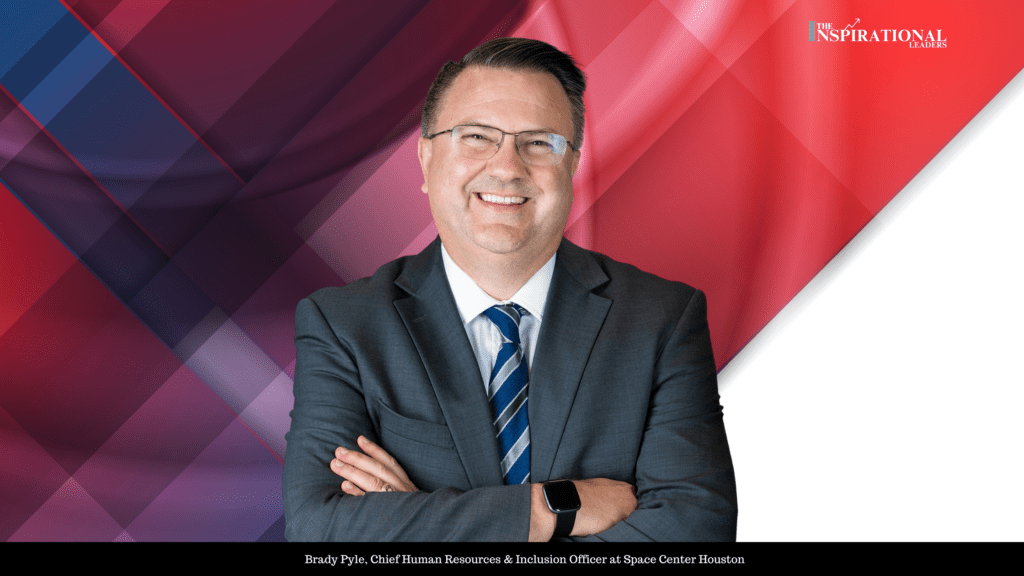In a legal industry often criticized for lagging behind in innovation, Fabio Cendão emerges as a refreshing force of change. As a Partner and the Head of Tech, IP, and Crypto/Web3 at Faria, Cendão & Maia Advogados (FCM Law), Fabio stands at the confluence of law, innovation, and purpose. His journey from the corporate sector to co-founding one of Brazil’s most forward-thinking law firms reflects not only his passion for technology but also a radical reimagining of what legal practice can and should be in the digital era.
True legal innovation is not about simply adopting new tools, but about reimagining the entire role of law in empowering people and protecting ideas. At the intersection of technology, business, and ethics, law becomes a proactive catalyst for progress — a bridge that transforms complexity into opportunity and safeguards the future while inspiring bold new paths. This vision drives a commitment to transform legal practice into a force that enables innovation rather than limits it.
From Corporate Roots to Founding FCM Law
Fabio Cendão’s professional journey did not begin in a traditional law firm. In fact, it was this very detour that led him to a career defined by innovation. “I started in the corporate world but quickly realized I wanted to work closer to innovation and technology—not just in terms of clients, but in how legal services are actually delivered,” he recalls.
In 2014, driven by this vision, Fabio co-founded FCM Law alongside two partners. The goal was ambitious yet clear: build a law firm tailored for the technology ecosystem. With a client base comprising startups and innovation-driven ventures, FCM Law took a distinct path from Brazil’s conventional legal institutions. Over time, Fabio’s work evolved to focus on technology law, intellectual property, and frontier issues like artificial intelligence, blockchain, and Web3.
Shaping the Legal Landscape at the Intersection of Technology
At FCM Law, innovation is not a buzzword; it’s an operational imperative. The firm delivers legal solutions that are not only business-aligned but also tech-embedded. “We specialize in structuring legal frameworks for startups, especially around fundraising and investment,” Fabio explains. Their offerings also extend to innovation consulting for legal teams, introducing methodologies like Legal Design, Legal Ops, and agile processes to transform how law is practiced.
Internally, the firm operates like a tech startup in many ways. Software tools and AI applications are integrated into daily workflows, empowering the team to boost efficiency while maintaining high-quality output. Fabio emphasizes that this internal evolution is key: “We invest in training our people to use technology smartly and ethically. It’s not just about adopting tools; it’s about reshaping mindsets.”
Navigating Legal Challenges in Crypto and Web3
The realm of crypto and Web3 is one Fabio knows intimately. As an advisor to numerous blockchain startups and decentralized projects, he and his team are consistently at the edge of regulatory development. “The legal uncertainties in this space are massive—from regulatory gray zones to market skepticism,” he says. Yet, these challenges offer opportunities to exercise legal creativity.
By blending rigorous legal analysis with out-of-the-box thinking, FCM Law helps clients navigate this complex ecosystem. Regular training sessions, internal workshops, and deep legal research keep the firm at the forefront. Their approach is both practical and visionary: build legal structures that are robust enough to protect clients yet flexible enough to accommodate future innovation.
The Evolution of Intellectual Property Law in a Tech-Driven Era
Technology is transforming intellectual property law faster than traditional legal systems can adapt. Fabio is quick to point out the emerging questions: “Who owns AI-generated content? How do you manage copyrights via blockchain? What does software licensing look like in a world of NFTs and smart contracts?”
In Fabio’s view, IP law must evolve in tandem with these technological shifts. Smart contracts and decentralized platforms present new models for IP licensing and distribution. Meanwhile, blockchain offers more secure, transparent ways to register and track rights. FCM Law is exploring all of these, working closely with technologists to test solutions that could define the future legal landscape.
Embracing LegalTech for Smarter Practice
Innovation at FCM Law is spearheaded by Studio FCM, the firm’s in-house innovation unit. This team experiments with emerging LegalTech tools to enhance both client services and internal processes. “We use AI for document review, analysis, and drafting. Everything goes through rigorous human oversight, of course,” Fabio notes.
This hybrid approach—leveraging AI without relinquishing human judgment—has paid dividends. Clients benefit from faster, more precise legal advice, while the firm enjoys streamlined operations. Fabio believes this is the future of law: “AI won’t replace lawyers, but lawyers who use AI will replace those who don’t.”
Meeting the Expectations of Tech-Savvy Clients
As the tech sector matures, client expectations are evolving rapidly. “They want speed, clarity, and deliverables that match their lean, agile workflows,” Fabio explains. He shares how some clients even use generative AI tools like ChatGPT to vet legal memos. Instead of resisting, FCM Law embraces this shift.
“We’re adapting by being faster and more business-oriented. We understand how these companies think and operate, and we tailor our communication and delivery to match,” he says. This responsiveness has made FCM Law a trusted advisor to some of Brazil’s most innovative startups.
True legal leadership in the age of technology is not about resisting change, but about guiding it with vision and integrity. Fabio Cendão shows us that the future of law belongs to those who see beyond today’s challenges to imagine tomorrow’s possibilities — and who have the courage to build that future, one innovative solution at a time.
Ethics in the Age of Legal AI
The rapid adoption of AI raises complex ethical questions—ones Fabio and his team take seriously. “We have strict policies, internal training, and compliance protocols to govern AI use,” he explains. Importantly, every AI-generated document is reviewed by a qualified attorney.
The firm also advises clients on responsible AI governance, whether AI is core to their business or simply a tool within their operations. “We believe human oversight is non-negotiable. AI should support legal work, not replace judgment,” Fabio states.
Fostering Innovation Through Collaboration and Learning
A firm rooted in innovation must also be a hub for continuous learning. At FCM Law, knowledge-sharing is a cultural pillar. Weekly meetings, internal forums, and expert guest sessions keep the team engaged with emerging tech trends.
Fabio encourages his colleagues to go beyond the law. “I want them to understand business, tech, and product development. It makes them better advisors and more complete professionals,” he says. This holistic approach enables the firm to tackle multifaceted challenges with confidence.
Why Cross-Disciplinary Collaboration is Essential
Fabio believes that LegalTech cannot thrive without collaboration between legal professionals and technologists. “Lawyers know the problems. Technologists build the tools. Without each other, they’re guessing,” he asserts. Effective Legal Design or smart legal automation tools are born when both perspectives inform the solution.
At FCM Law, this cross-functional mindset is actively cultivated. Whether they are creating a contract automation tool or structuring a DAO, the team seeks out diverse viewpoints to ensure legal strategies are both innovative and grounded.
Looking Ahead: The LegalTech Landscape of the Future
For Fabio, the future of legal services is already here—and it looks very different from the past. He cites generative AI as the single most disruptive force shaping legal work today. The impact on his own firm has been dramatic: “We went from 55 people to 16 in two years. That’s partly strategic, but also a result of AI integration.”
This leaner, more senior team structure is intentional. Junior roles are fewer because automation handles much of the foundational work. The firm’s value lies in strategic legal thinking—guiding clients through complexity with expertise that no AI can replicate.
“We don’t just sell legal documents. We help clients understand what structure they need, why it matters, and how to achieve it. That advisory role is irreplaceable,” Fabio emphasizes.
Conclusion: Redefining Legal Leadership in a Digital World
Fabio Cendão’s leadership exemplifies a new model for the legal profession—one that is agile, tech-savvy, and deeply human. At FCM Law, he is not only responding to the rapid pace of technological change but helping to shape it. Through strategic innovation, ethical responsibility, and a clear vision for the future, Fabio is proving that law can evolve without losing its soul.
As the legal landscape continues to shift, one thing is certain: the future belongs to firms like FCM Law and leaders like Fabio Cendão who are bold enough to embrace change, and wise enough to lead it with purpose.
True legal leadership in the age of technology is not about resisting change, but about guiding it with vision and integrity. Fabio Cendão shows us that the future of law belongs to those who see beyond today’s challenges to imagine tomorrow’s possibilities — and who have the courage to build that future, one innovative solution at a time.




